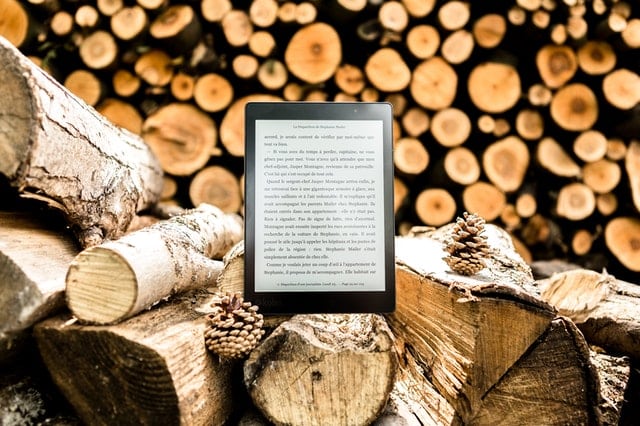Is an E-book Just a PDF?
June 27, 2022
“EBooks have many advantages – publishers don’t have to make guesses about how many books to print, books need never go ‘out of print,’ and hard-to-find books can be easily available.” — Kate Grenville
To the common observer, an eBook is merely an ordinary book in an electronic format. This misconception stems from regular print books becoming widely available by electronic means.
Undoubtedly, making books available electronically has greatly helped distribute literature to the masses. In a manner of speaking, electronic media has had a similar effect to what the printing press had centuries ago.
Nevertheless, it is important to note that an eBook is not just a PDF.
In this article, we will explore five reasons why an eBook is much more than an electronic version of a print book.
What is an eBook?
The Encyclopedia Britannica offers a wonderful definition of the term “eBook:”
“eBook, in full electronic book, digital file containing a body of text and images suitable for distributing electronically and displaying on-screen in a manner similar to a printed book. EBooks can be created by converting a printer’s source files to formats optimized for easy downloading and on-screen reading, or they can be drawn from a database or a set of text files that were not created solely for print.”
There are several items to unpack in this definition. Therefore, it is necessary to further expand on its point to fully grasp why eBooks are publications “that were not created solely for print.”
Five reasons why an eBook is much more than just a PDF
1. An eBook optimizes screen display.
In the beginning, eBooks were nothing more than scanned copies of print books. These image scans often posed readability issues.
More often than not, reading a scanned copy of a print book was harder than reading the print book itself.
Nevertheless, initial scans allowed the general public to access out-of-print or hard-to-find volumes.
Nowadays, eBooks optimize screen displays.

For instance, Amazon requires eBooks to follow specific guidelines to ensure perfect readability on its Kindle devices. As a result, producing an eBook demands that publishers build files compatible with eReaders, phones, and tablets.
This optimization facilitates a smooth reading experience.
Beyond a smooth reading experience, eBooks enable readers to enjoy a similar sensory experience, thanks to sound effects mimicking page-turning and visual effects such as dark mode. These features aim to make reading on an electronic device a much more pleasant experience.
2. An eBook utilizes multimedia.
Print books converted into electronic files (such as PDFs) merely recreate the print book experience on a digital device. However, eBooks strive to take full advantage of an electronic device’s multimedia capabilities. For instance, eBooks may include links to sources, websites, or video content.
The biggest advantage of multimedia capabilities is enhanced marketing opportunities. EBooks such as how-to guides or product manuals contain links to e-commerce sites or online shops where customers can purchase items. Additionally, eBooks can incorporate advertising, thus converting an eBook into a marketing tool.
In addition to marketing, educational publications like textbooks offer a plethora of additional resources students can use to further their learning. In a sense, eBooks are a springboard that allows readers to expand their horizons well beyond the words on the printed page.
3. An eBook exploits portability.
EBooks allow readers to carry an entire library in their pocket. As a result, the days of carrying stacks of books are long behind.
EBooks exploit portability, thus making it easy for readers to acquire as many volumes as they wish.
Furthermore, eBooks allow authors and publishers to remove page limits from their volumes.
How so? There are limitations to how many pages a volume can include with print books.

Voluminous publications become heavy and cumbersome to carry. For instance, encyclopedias require 20 to 30 tomes to cover a wide range of subjects.
This limitation is no longer the case with eBooks.
Reference materials can be as voluminous as needed.
Extensive publications can become a breeze to read with a good indexing system. A great example is the Holy Bible. Modern indexing systems facilitate looking up biblical passages by keywords. As such, readers need only input a relevant keyword to access the passage of their choice.
4. An eBook makes distribution easy.
EBooks make distribution much easier than traditional print publications. After all, users can easily download electronic files in seconds from anywhere in the world. In contrast, print publications require a logistical framework to ensure their distribution.
One could also argue that electronic versions of print books can leverage the same distribution advantages. However, there is one key difference: Print books require human intervention to make them electronically available.
For instance, older print books, which only exist in print format, must either be typed or scanned. As a result, converting print books to a digital format is a labor-intensive endeavor, since current artificial intelligence tools still cannot scan and convert images to text with 100% accuracy.
Google’s massive digital scanning project is a great example of an attempt at converting print books to digital format.
In 2002, Google’s founders set out to scan every book on the planet. In its effort, Google enlisted the help of thousands of volunteers, as it is virtually impossible to fully automate the scanning process.
Within roughly 10 years, the project Google managed to scanned about 25 million books. That is, until a court battle from publishers and authors halted Google’s efforts and ended the project, leaving a huge database of books that nobody is allowed to read.
EBooks solve the need to scan print books from the start. Publishers conceive eBooks for electronic distribution. While eBooks may also go into print, it is much easier to print an eBook than to convert a print book into an eBook.
5. An eBook removes entry barriers.
Publishing a traditional print book generally requires authors to go through the rigors of the publishing business.
For instance, aspiring authors must find book agents willing to give them an opportunity. Then, manuscripts must go through editing before a publisher takes a chance on publishing them.
In the meantime, authors can wait years before they get their chance to see their works go into public distribution.

Self-publishing a traditional print book is a costly endeavor. In addition to writing, editing, and printing, distribution and marketing require a considerable financial investment. Moreover, marketing a book, electronic or print, requires a substantial effort.
EBooks remove entry barriers by facilitating the publication and distribution process. In the past, self-published authors needed tens of thousands of dollars to bring their books to publication. Nowadays, self-published authors can get their materials out to the public for a few hundred dollars.
While self-publishing has hardly made traditional publishers redundant, readers have greatly benefitted from increased publications. Readers can reap the bounty of new authors, titles, and subjects making their way into the mainstream.
How can a ghostwriter help produce an eBook?
Producing an eBook is no easy task. It requires research, writing, editing, and design. In many instances, authors aspire to publish their ideas but struggle to make their projects come to fruition. This point is where a ghostwriter can facilitate the entire process.
Here are three key ways in which hiring a ghostwriter to write an eBook can make any book project a reality.
Ghostwriters are great at research.
Hiring a ghostwriter goes beyond writing. Professional ghostwriters are generally great at research.

They know the ins and outs of their field. They also know reliable information sources that give publications credibility.
A well-researched eBook, regardless of length, is highly valuable. Authors can, therefore, save time and effort by hiring a professional ghostwriter to conduct meticulous research.
Ghostwriters are great at writing.
It may seem obvious to think that ghostwriters are great at writing. However, great writing goes far beyond articulating prose.
Professional ghostwriters know how to tailor information so that it matches the target audience’s expectations.
Consequently, hiring a professional ghostwriter ensures that the final publication succeeds at compelling readers to consume its content.
Ghostwriters are great at communicating.
Authors have specific purposes when producing an eBook. These purposes may be to inform, entertain, or raise awareness.
Professional ghostwriters have a knack for communicating the author’s intended message. For example, a professional ghostwriter can articulate a narrative that turns a marketing eBook into a valuable source of product information. As a result, customers not only gain exposure to the product but also acquire a valuable reference resource.
On the whole, hiring a ghostwriter takes the guesswork out of producing a high-quality eBook.
Authors and publishers can rely on a professional ghostwriter to produce top-notch material that fulfills its intended purpose.

This key characteristic ensures that authors and publishers have time, effort, and money when producing an eBook. After all, a subpar eBook may prove costlier. So, why take chances when a ghostwriter can help remove uncertainties?
One Final Thought
EBooks have never intended to replace traditional print books.
They serve as a tool to get information out to the public. Thus, eBooks require careful attention to ensure they fulfill their purpose.
Authors and publishers must, therefore, safeguard their publications’ standards. In the highly competitive publishing world, there is little room for chance.
Authors and publishers can minimize their risk and uncertainty by hiring a ghostwriter.
Professional ghostwriters know what it takes to produce a great narrative while establishing credibility. Now, more than ever, hiring a ghostwriter can help make a book project a reality.






























